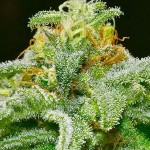5 Studies that show Cannabis can help treat Parkinson’s
One of the most common and perhaps heartbreaking degenerative disorders in the world today, Parkinson’s Disease is a disorder of the central nervous system as a result of the death of dopamine generating cells in regions of the brain.
One of the reasons as to why Parkinson’s is considered such a selfish, agonising disease may be down to its lack of answers. There is no known reason as to why the cells degenerate and no definitive cure to the disease itself.
However, despite its relentless nature as a degenerative disease, there are ways in which the side effects of Parkinson’s can be managed. Over the past 30 years, research into the medicinal benefits of marijuana on Parkinson’s have provided some fascinating conclusions:
1. In 2004, 339 patients attending the Prague Movement Disorder Centre were given a survey regarding cannabis use. 25% of respondents had used cannabis in order to combat their disease. Of these 25%, 45.9% noted that cannabis use had assisted with significant improvements in their condition.
2. In 2001, the Department of Neurology at Royal Manchester Infirmary, UK, revealed that the use of synthetic cannabinoid nabilone significantly reduced Dyskinesia in all 7 tested Parkinson’s patients. Dyskinesia is an involuntary muscle movement disorder that is often a symptom of Parkinson’s.
3. In one of the earliest studies of its kind, a 1985 report in the Journal of Neuroscience explained how CBD can reduce Dystonia and Dyskinesia symptoms in a Parkinson’s patient. The patient, a 42-year- old man with an 8-year history of parkinsonism, suffered with peak-dose dyskinesia and action dystonia. Prescription drugs Trihexyphenidyl and bromocriptine were given to the patient initially; with each producing only slight improvement. To stable optimal dosages of the three drugs, CBD was added. Once given CBD orally, there was a decrease in clinical fluctuations and in dyskinesia scores (by 30%) without a significant worsening of the parkinsonism.
4. Another study by the Journal of Neuroscience in 1986 evaluated the effect of CBD in dystonic movement disorders. CBD was given to 5 patients orally, alongside their already prescribed medicine. In all 5 tested subjects, an improvement of 20 to 50% in their dystonic symptoms was noted.
5. In 1998, the Journal of Movement Disorders published a study regarding the effect of nabilone on Parkinson’s patients suffering with Dyskinesia. In 7 studied patients, nabilone proved more effective than prescription drugs using the Goetz scale. 2 of the patients were noted as having vast improvements in their symptoms after using nabilone.
 |
 |
 |
 |
| Read Parkinsons Treatment Diaries | Discuss Parkinsons on our Forum | Read more on our Parkinsons Page | Find Top Parkinsons Strains |
